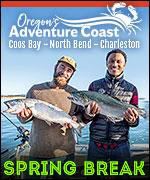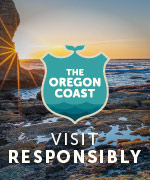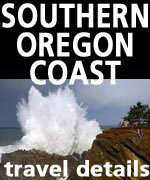Leave Wildlife Babies Alone in Forests, Fields as Well as Coastal Beaches
Published 5/04/24 at 11:05 p.m.
By Andre' Hagestedt, Oregon Coast Beach Connection

(Oregon Coast) – It's the season of babies out in the wild around Oregon: spring is birthing season for all kinds of creatures and critters around the state. Deer fawns, elk calves, pups and other kinds of young should be left alone, says Oregon Department of Fish and Wildlife – not just the adorable baby seals you encounter on the coast. (Photo ODFW)
Includes exclusive listings; some specials in winter
In Cannon Beach:
Includes rentals not listed anywhere else
In Manzanita, Wheeler, Rockaway Beach:
Some specials for winter
In Pacific City, Oceanside:
Some specials for winter
In Lincoln City:
Some specials for winter
In Depoe Bay, Gleneden Beach:
Some specials for winter
In Newport:
Look for some specials
In Waldport
Some specials for winter
In Yachats, Florence
Some specials for winter
Southern Oregon Coast Hotels / Lodgings
Reedsport to Brookings, places to stay; winter deals
“Finding a young wild animal alone does not mean it needs to be rescued,” the agency said. “In fact, the best course of action is to leave them where you find them.”
Any advice you're likely to hear if you get hold of ODFW is to “put it back.”
There's a misconception often in play that makes people believe a young animal in a forest, riverside or field that's left alone may be in trouble or abandoned. They are not orphaned, and no matter how well-intentioned the urge to intervene it's a really bad choice.
According to ODFW's wildlife veterinarian Julia Burco said people actually could be sentencing a young creature to death by snapping it up and trying to “rescue” the little one. It turns out you're taking it from its natural environment and its parents.
“Never assume one of a young animal is orphaned unless you saw the parent killed,” said Buco. “In almost all cases, the parent will return once it is safe to do so, like when people and dogs aren’t around.”
You hear this all the time with baby seals on the Oregon coast, but it applies to little ones all over the wild.
In those rare cases an animal is truly injured or orphaned, it will need special care from licensed rehabilitators and / or those with actual knowledge of these animals.
Beyond this being a bad idea for the animal, it's also illegal. “Capturing” or removing wildlife from its habitat and keeping it in captivity is against the law law (OAR 635-044-0015), as is transporting many animals.
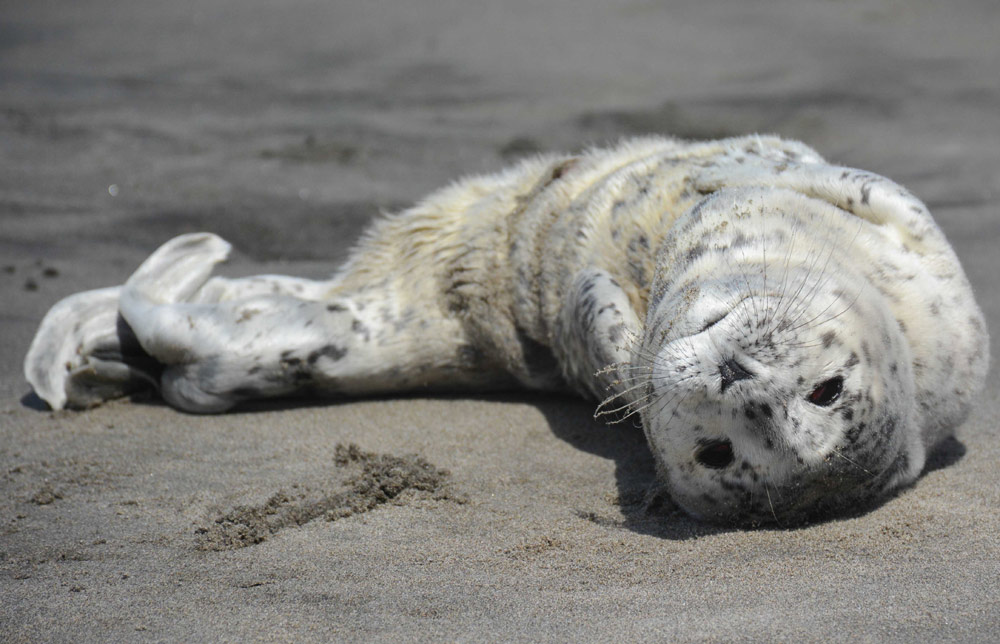
Seaside Aquarium photo
In 2023, seven people were cited for such offenses, said ODFW's Michelle Dennehy.
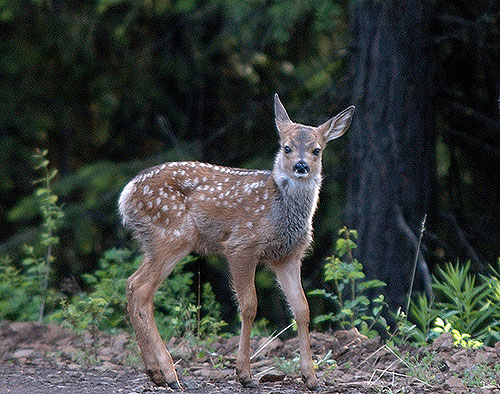
Mammals, of course, are the largest group of creatures you may run across in forests of the region – as well as those wildlife areas next to the Oregon coast. However, baby birds are also another concern.
Deer, elk and other mammals:
- Never assume an animal is orphaned. Don’t remove it from the forest, including your backyard. Female deer and elk and other mammals will often leave their young temporarily for safety reasons or to feed elsewhere. They will return when it is safe to do so (when people, dogs, or predators are not present).
- Call your local ODFW office, Oregon State Police office, or a local licensed wildlife rehabilitation center when: 1) you see an animal that you know is orphaned because you observed the dead parent animal, or 2) the parent hasn’t returned for several hours or even up to a day, or 3) if the animal is clearly inured or in distress.
Bunnies are rarely orphaned; mother rabbits only visit den sites at dusk and dawn to feed her young.
- Keep your dog or cat away from young wildlife, especially in the spring.
- If you see a seal pup, young sea lion, or other marine mammal that appears stranded or in distress, contact OSP’s hotline at 1-800-452-7888.
Birds:
- Leave fledgling birds alone. It is natural for fledgling (mostly feathered) birds to be awkward while learning how to fly. If you see one on the ground, leave it alone and keep your distance. Bring your pets under control and indoors if possible. The mother bird will feed it for several days on the ground until it “gets its wings.
- Return nestling birds to the nest. Nestlings (baby birds not fully feathered) found on the ground can be gently and quickly returned to the nest. If the nest is out of reach, place the bird on an elevated branch or fence, or in a nest made from a small box, out of the reach of children and pets. Leave the area so the parent birds can return.
- Bring your pets indoors. Cats are a major cause of injury and death for all birds, killing millions of birds in the US annually. Keep your pets away from fledgling birds learning to fly.
- Be careful when pruning trees as there may be a bird nest in the branch. Wait until birds are out of the nest.
- Beware of cavity nesters. Barn owls and other birds could be nesting in hollowed-out trees or logs and in haystacks.
- What if a bird flies into a window and appears hurt? Birds can be confused by reflective surfaces and mistakenly fly into windows. If you find a bird that has been stunned as a result of a window strike, put the bird in an uncovered box with a towel on the bottom. Keep it in a quiet place away from pets and check back in a couple of hours. If the bird has recovered, it will have flown off. If not, contact a local ODFW office or your local wildlife rehabilitator.
- Let turtles cross the road. In May and June, females begin searching for suitable nesting grounds to lay their eggs. If you see a turtle on the ground, the best thing to do is leave it alone and let it continue on its path. It’s fine to move it off a road (if it is safe for you to do so,) but put it on the other side, where it was headed.
Oregon Coast Hotels in this area - South Coast Hotels - Oregon Coast Vacation Rentals - Where to eat - Maps - Virtual Tours
Cannon Beach Lodging
Nehalem Bay Lodgings
Manzanita Hotels, Lodging
Three Capes Lodging
Pacific City Hotels, Lodging
Lincoln City Lodging
Depoe Bay Lodging
Newport Lodging
Waldport Lodging
Yachats Lodging
Oregon Coast Vacation Rentals
Oregon Coast Lodging Specials
More About Oregon Coast hotels, lodging.....
More About Oregon Coast Restaurants, Dining.....
 Andre' GW Hagestedt is editor, owner and primary photographer / videographer of Oregon Coast Beach Connection, an online publication that sees over 1 million pageviews per month. He is also author of several books about the coast.
Andre' GW Hagestedt is editor, owner and primary photographer / videographer of Oregon Coast Beach Connection, an online publication that sees over 1 million pageviews per month. He is also author of several books about the coast.
LATEST Related Oregon Coast Articles
April Gets Even Cheaper Midweek at Depoe Bay, Lincoln City: Oregon Coast DealsOff-season rates plus more at Keystone Vacation Rentals. Depoe Bay lodging specials, Lincoln City hotel reviews, Newport hotel reviews
Oregon Coast Has World's Oldest Harbor Seal, Celebrating 50 Years Soon
June 3 at Oregon Coast Aquarium in Newport. Newport events
Cannon Beach Sandcastle Contest 2025: N. Oregon Coast Tradition Happens June 21
Started in '64 after a tsunami hit town. Newport events Manzanita events, Cannon Beach events, Seaside events, Astoria events
Stabbed Seal Ends Up Having Comic Adventures on Oregon / Washington Coast
Happy ending for the elephant seal with tales from Oceanside to Long Beach. Marine sciences
Why Now Could Be a Great Week for Spotting Killer Whales on Oregon Coast - Video
A good dozen documentations around Depoe Bay, Newport, Coos Bay, Bandon, Tillamook. Marine sciences
Road Work Coming to North Oregon Coast's Gearhart and One of World's Largest ...
Lane closures this summer on the bridge; major work in Gearhart next year. Washington coast
Florence Latest Oregon Coast Town to Add Mobi-Mats, Hearing Loops, More Acces...
Florence is increasing efforts to ensure fun for all guests. Travel tips
Oregon's Tillamook Coast Hosts Rigorous Kayaking, Hiking Events in May
Netarts events May 17 and 31; Manzanita events May 14
Back to Oregon Coast
Contact Advertise on Oregon Coast Beach Connection
All Content, unless otherwise attributed, copyright © Oregon Coast Beach Connection. Unauthorized use or publication is not permitted














